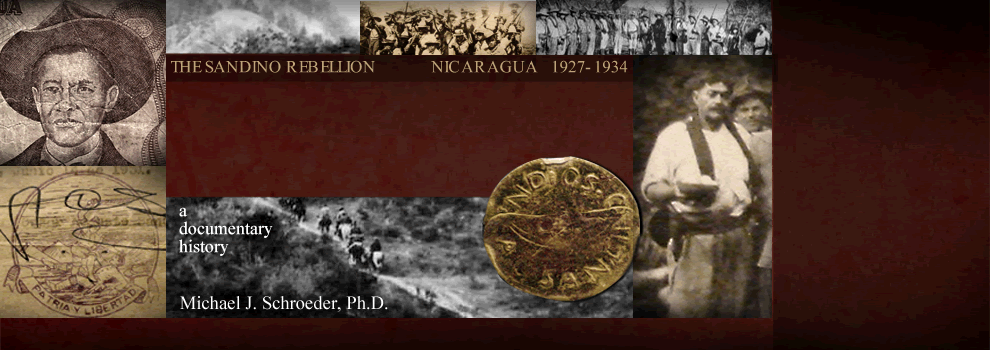|
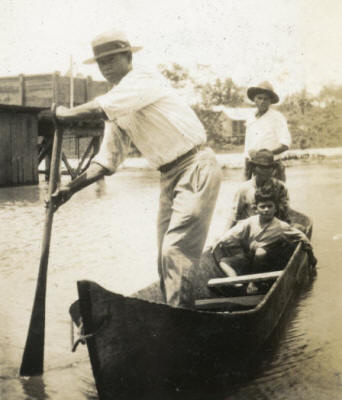 THIS IS THE FIRST PAGE
of documents for the SECOND HALF of 1929
on Nicaragua's Caribbean Coast, housing materials
dated during July, August & September,
the first three months of
Sandino's yearlong sojourn to Mexico.
THIS IS THE FIRST PAGE
of documents for the SECOND HALF of 1929
on Nicaragua's Caribbean Coast, housing materials
dated during July, August & September,
the first three months of
Sandino's yearlong sojourn to Mexico.
The same sets of themes emerging from previous pages
infuse this one: the
struggles of Miskitu Indians &
other Costeños for their rights as
citizens; tensions between the US
Marines and local residents on the
one hand, and the region's largest
US-owned companies on the other; and
Marine-Guardia efforts to locate the
elusive rebel bands deep in the
interior. Especially
noteworthy here are the multi-page
documents describing conditions in
the mining districts, especially H.
D. Alban’s 21 July reports on the La
Luz-Siuna & Neptune mines, and Lt.
Cresswell’s detailed report of Sept.
13, which
includes some illuminating
descriptions of Neptune Mine & its
history. Col. Marston’s orders
for “Inspections of the Eastern
Area” (16 Sept) & his “Inspection
of the District of Rama” (22 Sept)
also offer many helpful details,
while the Marines’ efforts to
recruit & train Guardia recruits on
the Coast receive attention both in
official reports and in The
Bluefields Weekly.
|
|
PERIOD MAPS
|
|
1894 mosquito
shore

27 MB,
library of congress
|
1920s
Standard Fruit

6.5 mb,
US National archives
|
1928 Rio wanks
Patrol

3 mb, us
national archives
|
1931 Moravian

2.4 mb,
comenius press
|
|
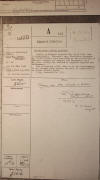
|
1.
5 July 1929.
"The Mosquito Indian Question,"
British Chargé
d'Affaires Stanford London,
Managua, to Mr. Cragie, British Foreign
Ministry, London, p. 1.
|
|
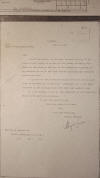
|
2.
5 July 1929.
"The Mosquito Indian Question,"
British Chargé
d'Affaires Stanford London,
Managua, to Mr. Cragie, British Foreign
Ministry, London, p. 2.
|
|
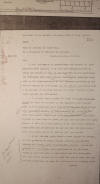
|
3.
5 July 1929.
"The Mosquito Indian Question,"
British Chargé
d'Affaires Stanford London,
Managua, to Mr. Cragie, British Foreign
Ministry, London, p. 3.
|
|
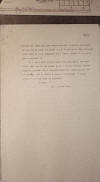
|
4.
5 July 1929.
"The Mosquito Indian Question,"
British Chargé
d'Affaires Stanford London,
Managua, to Mr. Cragie, British Foreign
Ministry, London, p. 4.
|
|
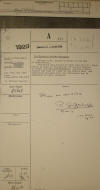
|
5.
5 July 1929.
"The Mosquito Indian Question,"
British Chargé
d'Affaires Stanford London,
Managua, to Mr. Cragie, British Foreign
Ministry, London, p. 5.
|
|
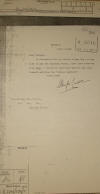
|
6.
5 July 1929.
"The Mosquito Indian Question,"
British Chargé
d'Affaires Stanford London,
Managua, to Mr. Cragie, British Foreign
Ministry, London, p. 6.
|
|
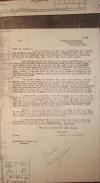
|
7.
5 July 1929.
"The Mosquito Indian Question,"
British Chargé
d'Affaires Stanford London,
Managua, to Mr. Cragie, British Foreign
Ministry, London, p. 7.
|
|
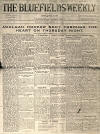
|
6 July 1929.
The Bluefields Weekly, p. 1.
|
|
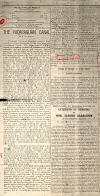
|
6 July 1929.
The Bluefields Weekly, p. 2.
|
|
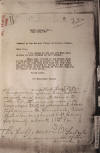
|
10 July
1929.
Letter from
Esperanza Flores, Puerto Cabezas,
to Command of the Marine Forces at
Puerto Cabezas, p. 1.
|
|
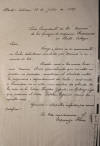
|
10 July
1929.
Letter from
Esperanza Flores, Puerto Cabezas,
to Command of the Marine Forces at
Puerto Cabezas, p. 2.
|
|
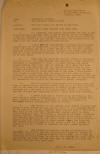
|
21 July
1929.
Report on Property Values and Upkeep La
Luz Mine, H. B.
Alban, Marine Detachment, La Luz
Mine, to CO Eastern Area.
"1. Mr. Peterson,
the general caretaker has been in the
hills working a personal claim since my
return on the seventeenth. A written
statement will be procured on his return
and attached if he returns before the
mail leaves. Otherwise the statement
will be sent in by the first available
transportation. ¶ 2. I have had the
opportunity of reading the engineer’s
report made on the properties. I have
also seen the drafts which cover the
monthly payroll. I have talked to all
the men formerly employed here who are
still around including the former mine
foreman who is now employed at Neptune.
My own opinion may therefore be of some
value. ¶ 3. There are six buildings in
good condition including the one housing
the assay furnace and laboratory. These
buildings represent an investment of
about a thousand dollars and would
unquestionably cost twice that to
replace. It is said that they would have
been destroyed had not several natives
loyal to the company persuaded the
bandits into believing the houses had
been seized by them and no longer
belonged to the mine. A more creditable
theory is that they were preserved with
the idea of future company by bandit
headquarters as Sandino was thoroughly
familiar with the locality. In either
case the buildings need no protection in
themselves but do offer an inducement to
bandit occupancy. ¶ 4. The mill and all
parts therein are a total loss and have
no value even as possible spare parts as
it is almost certain that in the case of
a resumption a different process would
be employed and a new type of mill
constructed. There is one small turbine
in excellent condition which is being
carefully preserved. ¶ 5. A water line
from a reservoir in the hills is the
most valuable asset the company has. It
cost between seventy five and a hundred
thousand to construct. It could not
however be destroyed without
considerable time and effort. ¶ 6. The
reports of the diamond drill assays
indicate that there is about twelve
million dollars’ worth of ore averaging
$4.80 to the ton in the La Luz property.
About ten percent of this is in free
gold if the mine were inadequately
guarded would be about forty thousand a
year. This seems a reasonable estimate.
I have in company with Mr. Peterson
inspected sixteen spots where a pan of
gold bearing earth showed such heavy
traces as to indicate that a sluice box
would yield two or three ounces a day.
One hole had been worked with an average
of two ounces a day for a month. Of
course no one can attempt to forecast
how deep placer deposits will run. ¶ 7.
The company now employs two men in
addition to Mr. Peterson. One patrols
the area daily and the other has charge
of the water line. Mr. Peterson received
$75 a month, the second man fifty and
the third forty. In addition the company
has spent about one hundred and fifty
dollars this year in keeping up fences
and keeping clearing free from brush. ¶
/s/ H. B. ALBAN"
|
|
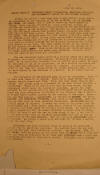
|
21 July
1929.
Report on Bandit Information, Political
Situation and Personality Report on
Influential Persons in La Luz / Siuna /
Neptune district,
H. B. Alban, La Luz Mine, to CO
Eastern Area Major
C. F. Metcalf, p. 1.
"During
the period I have been here I have
visited every family of prominence in
the vicinity of LA LUZ or SUINA; and of
NEPTUNE, SAN PEDRO, and LIMON, with a
view to observing their manner of
living, their general attitude and their
potential ability as leaders and
organizers. With the exception of one
man there are no troublemakers in the
vicinity. The natives are unusually
prosperous. The men run small
plantations raising beans, plantain, and
corn. They also raise beef cattle.
Nearly all the streams have gold bearing
sands. The children wash out gold
running from fifty cents to two dollars
a day each. In the rainy season small
flumes are built in all the steams and
the gold production is about doubled.
All give credit or pay cash. The only
chance of any of the people are LA LUZ
turning to banditry would be the seizing
and closing of the stores by armed
bands. This would eliminate any
practical market for the small gold
producer and cause some hardship.
However, even the fish and game of all
sorts are plentiful. ¶ The one exception
noted above as a troublemaker is a man
named Fernandez. Originally from
Jamaica, Fernandez is now acting
commandante. He is absolutely harmless,
has no quality as a leader to speak of,
and none at all as an organizer. He is a
chronic inebriate and when under the
influence of liquor is a nuisance. He
attempted to shoot up the town the night
before my return from PIS PIS. He fired
one shot before he was disarmed by a
Marine. He no longer has any weapons. ¶
The situation in the PIS PIS AREA is not
so promising. There is no free gold
there to be wasted. There is no game
within two days journey except
occasional foul. There are only small
fish in the rivers. The entire area is
dependent on the mine either directly or
indirectly. There is no cash except what
Marines spend, company commissary chits
being the medium of exchange. Almost the
sole industry is the manufacture and
sale of ‘boot-leg’ native liquors. There
are four prosperous distillers in the
vicinity that I know of. Of course their
market depends on the working of the
mine. There are two possible leaders –
ALTAMIRONO, (a brother of PEDRON) who
lives at NEPTUNE, and FERNANDEZ
GUTIERREZ, who lives at SAN PEDRO. Each
has four or five more or less permanent
follows. ALTAMIRANO has no visible means
of support. A woman who lives at his
house (not his ‘matrimonio’ but a fee
lance) pays him a portion of her
earnings. He leaves town from eight to
ten days every month. He claims to have
a small plantation but the woman
referred to above says he brings nothing
in from it and she has no idea where it
is. A boy who lives at the same house
says he followed ALTAMIRANO once and he
has no plantation in two days journey.
The boy believes ALTAMIRANO goes to see
PEDRON. Am having a watch kept and will
try to have a native trail the next
trip. ¶ GUTIERREZ has been arrested
twice on charges of murderous assault
but no proof was possible. The natives
fear him and will speak of him only when
absolutely private. The Chinaman, WONG,
at SAN PEDRO, told me openly in his
store that GUITIERREZ was a very good
man. He told me privately in my room
that GUITIERREZ was a thief and a
murderer and that he then had a pistol.
GUITIERREZ had a brother with SANDINO .
. . "
|
|
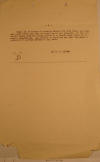
|
21 July
1929.
Report on Bandit Information, Political
Situation and Personality Report on
Influential Persons in La Luz / Siuna /
Neptune district,
H. B. Alban, La Luz Mine, to CO
Eastern Area Major
C. F. Metcalf, p. 2.
" . . . There is
of course no present danger but with
these two leaders and about fifty men
with no families in the vicinity, if the
mine should close down the organization
of a bandit band would be no remote
possibility. At present indications are
that the mine will operate for several
months at any rate. ¶ /s/ H. B. ALBAN. "
|
|
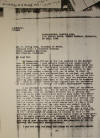
|
1.
26 July 1929.
Letter from Major
C. F. Metcalf, CO Eastern Area,
Puerto Cabezas, to Mr. Irving Moss,
Chairman of the Board, Standard Fruit &
Steamship Company, New Orleans LA, p. 1.
"As Commanding
Officer of the U. S. Marines in the
Eastern Area of Nicaragua, I have
certain requests and complaints to make
of the Standard Fruit & Steamship
Company which under the circumstances I
do not feel should be made to anyone in
a subordinate position. I am therefore
taking the liberty to communicate this
matter directly with you in order to
avoid it being passed about from one
subordinate to another, and action
delayed thereon. After careful
consideration of the matter during the
past three months I do not feel that the
services rendered by your Company have
been at all what should be expected to a
force of United States troops engaged
upon the protection of your property in
a foreign and highly disorganized
country. ¶ I am informed by Captain
Shaler Ladd, USMC, of the Marine
Barracks, New Orleans, La., who is
acting as my forwarding agent for
supplies, that the services rendered him
in getting supplies to us by your
Company have been in many cases very
unsatisfactory. He tells me that on
several occasions he was notified by
your Company that ships were to leave at
a certain time and in anticipation of
this sailing delivered more or less
perishable stores to your ships which
became more or less a total loss due to
the fact that the ship would not accept
them on account of not sailing until a
later date. He also tells me that on
several occasions he had been notified
that a ship was to leave on entirely too
short a notice to deliver our supplies
to it. On two separate occasions he
informs me that it was necessary for him
to get Headquarters Marine Corps at
Washington, D.C., to exert pressure on
your Company in order to get our
supplies accepted for shipment. He
advises me that the attention paid him
by your shipping office with the
exception of one individual has been
very unsatisfactory. ¶ I can not help
but feel that since we are entirely
depen- . . . "
|
|
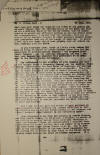
|
2.
26 July 1929.
Letter from Major
C. F. Metcalf, CO Eastern Area,
Puerto Cabezas, to Mr. Irving Moss,
Chairman of the Board, Standard Fruit &
Steamship Company, New Orleans LA, p. 2.
". . . dent upon
your ships for supplies and since we are
paying you an ample freight rate for
transportation of the same, and that we
are a military force of the United
States, that we should receive as prompt
and efficient service as you can render
under the circumstances. I do not feel
for instance, that the interests of an
American tourist or other pleasure
seekers should have precedence over any
of our people or supplies. In short, I
feel that our needs should have priority
over all others except possibly your own
needs. ¶ As you doubtless know, there is
little other excuse for Marines being
stationed at Puerto Cabezas other than
for the protection of your subsidiary
Company - the Bragmans Bluff Lumber
Company - and its American employees,
and may I add that your company has
received this protection at no small
cost to the United States Government. ¶
The difference in the attitude of your
Company and that of the Cuyamel Fruit &
Steamship Company and the American Fruit
Company, operating on the East Coast of
Nicaragua and serving us with their
steamships has been very noticeable. The
attitude of these Companies has been to
assist Marines in every possible way and
in many cases to accept no remuneration
for services rendered. The Cuyamel Fruit
Company has transported our supplies
during the entire time of our occupation
of this Coast, to our outposts in the
interior without accepting any payment
for services rendered. They have never
charged us one cent for transporting men
wherever their boats and barges ran.
They have transported our men and
officers while on leave to and from the
United States on free passes. Where the
United States Government was paying for
ocean transportation, either for
supplies or men, the usual fare was of
course paid to them. The ships of the
American Fruit Company have allowed our
officers and men traveling on leave to
take passage at one half rate.
Practically all steamship companies that
I am familiar with, give some reduction
to service personnel who were traveling
at their own expense. ¶ May I ask that
you give the matter of poor services on
your steamships your personal and prompt
attention so that our supplies may be
handled expeditiously at New Orleans,
and without constant embarrassment to
our forwarding agent? ¶ Your steamship
rates from New Orleans to Puerto Cabezas
and from Puerto Cabezas to Colon are, I
believe, in excess of the ability to
pay, of Marine Corps personnel traveling
at their own expense. Under the
circumstances I consider them
prohibitive and do not believe that any
member of my command will make these
trips unless forced to do so. Due to
your rate to the United States it has
been found impossible for the average
man to return by your ships to the
United States in many cases even in the
event of extreme emergency. If a . . . "
|
|
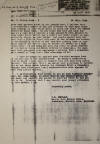
|
3.
26 July 1929.
Letter from Major
C. F. Metcalf, CO Eastern Area,
Puerto Cabezas, to Mr. Irving Moss,
Chairman of the Board, Standard Fruit &
Steamship Company, New Orleans LA, p. 3.
". . . rate were
granted which is not prohibitive, I
believe that a considerable number of
men and officers in this Area would take
passage on your ships while on leave and
visit the United States or Canal Zone.
No one would ask that you haul our men
at a loss but I believe a less expensive
rate granted to them would still turn
you a profit and would result in
considerable travel on your ships. Our
people cannot help but feel that a
$120.00 round trip rate to New Orleans
and return, is overcharging us when we
see tourists passing here on your ships
making the entire trip to Panama and
return at a much lower rate. If you
could see your way cleat to grant
members of the Marine Corps and Naval
Service in Nicaragua, the same rate that
you grant your employees I believe that
a considerable number of them would take
advantage of it. ¶ I have no complaint
against your district manager here or
against any of his subordinates. Mr
McKay’s cooperation with me since I have
been in command here has been very
satisfactory. The matters that I am
asking your attention to rectify for us
are those which involve the Standard
Fruit and Steamship Company over which
your local representative here appears
to have very little control. ¶ I am
forwarding this letter to you by your
district manager here, Mr. John McKay,
in order that he may comment freely on
the same, and amplify any points in
question which he may see fit to do.
Trusting that I may receive your prompt
attention in this matter, I am, ¶
Sincerely yours, ¶ C.H. Metcalf, ¶
Major, U.S. Marine Corps, ¶ Commander,
Eastern Area, Nicaragua"
|
|
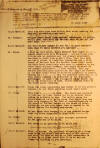
|
1.
26 July 1929.
Interview by
Major C. F. Metcalf of Fruit
Company Managers Mr. Vaccaro & Mr.
McKay, Puerto Cabezas, p. 1.
|
|
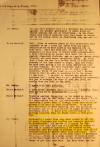
|
2.
26 July 1929.
Interview by
Major C. F. Metcalf of Fruit
Company Managers Mr. Vaccaro & Mr.
McKay, Puerto Cabezas, p. 2.
|
|
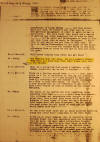
|
3.
26 July 1929.
Interview by
Major C. F. Metcalf of Fruit
Company Managers Mr. Vaccaro & Mr.
McKay, Puerto Cabezas, p. 3.
|
|
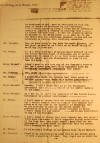
|
4.
26 July 1929.
Interview by
Major C. F. Metcalf of Fruit
Company Managers Mr. Vaccaro & Mr.
McKay, Puerto Cabezas, p. 4.
|
|
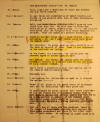
|
5.
26 July 1929.
Interview by
Major C. F. Metcalf of Fruit
Company Managers Mr. Vaccaro & Mr.
McKay, Puerto Cabezas, p. 5.
|
|
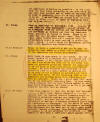
|
6.
26 July 1929.
Interview by
Major C. F. Metcalf of Fruit
Company Managers Mr. Vaccaro & Mr.
McKay, Puerto Cabezas, p. 6.
|
|
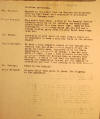
|
7.
26 July 1929.
Interview by
Major C. F. Metcalf of Fruit
Company Managers Mr. Vaccaro & Mr.
McKay, Puerto Cabezas, p. 7.
|
|
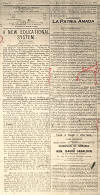
|
27 July
1929.
The Bluefields Weekly.
"A
NEW EDUCATIONAL SYSTEM, By R.
M. Hooker. ¶ The greatest national asset
in any democracy is an adequate
educational system. Nicaragua is sadly
lacking in this respect at present. In a
recent book on the late Nicaraguan
revolution this startling statement was
made, “More than seventy five percent of
the population of Nicaragua is
illiterate”. Now, what must we expect
from such a condition? Yet we in Central
America have had civilization for
fourhanded years. How can we account for
this high rate of illiteracy among our
people? Here is the answer: -- Colonial
Nicaragua was a land of aristocrats.
There were a proportionate number of
peons, the reason for whose existence,
in the eyes of the aristocrats, was that
of working for the upper classes. The
sons of the upper families were sent to
Spain to be educated, principally in the
fine arts. They returned to become
governors and other officials in the
Spanish American colonies. It was to the
interest of the aristocracy to see that
the peons were held down. These
veritable slaves, and the classes
immediately above them, were denied the
privileges of a good education. The
spirit which prompted such a policy has
died out, but the influences remain to
the present day in the inadequate system
of primary education. In the democracy
that we are building up emphasis should
be laid on a liberal education for all
our citizens, with highly trained
instructors on modern pedagogical lines.
These instructors should not be
overworked. The day for the one room
school with one teacher for the entire
student body is a thing of the past. We
must be well equipped to meet the
demands of the age. We must endeavor to
develop an educational system that is
suited to the nature of our people and
or country. In my estimation the best
educational program that we in Nicaragua
need at present is industrial
education—that is, the pursuit of the
manual arts in order to make our people
skilled artisans and craftsmen. This is
the method that people of all
civilizations have followed. They were
tradesmen, and later as they progressed
they developed the higher professions.
It has often been said that in
proportion Latin America has more
lawyers than al the other continents
combined. But Latin America cannot point
to an engineer like Goethals or
DeLesseps, nor to a financial wizard
like Rockefeller, nor to an industrial
magnate like Ford. Our education will
lead to the solution of petty hatreds
and acts of disunity which have
destroyed the organization of our
government on more occasions than one.
It will save us from civil strife which
really benefits no one but eh eager
imperialists the world over. Knowledge
is power. The youth of Nicaragua must
realize this fact,--that to assume the
burdens of self-government on a more
efficient basis we must be liberally
prepared. We do not object to
specialization in education. We advocate
it but we believe in giving the youth,
for a foundation, a broad education in
the arts and sciences, and allowing him
to choose his profession after. After
his recent visit to Mexico, John Dewey
the great American educational
philosopher said, “the salvation of
Mexico will come through education”.
This is true, not only of the land of
Montezuma, but also of all Latin
America. The Latin Continent has yet to
develop her educational system to suit
her own needs, and the temperament of
her people. It is the writer’s belief
that we should endeavour to develop on
three lines. We should educate. We
should develop a centre or centres of
sentiment which will form a rallying
post or rallying posts for the continent
or the countries. We should
industrialize and thus become
independent of the tender mercies of
other countries."
|
|
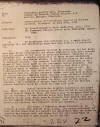
|
1.
6 August 1929.
Investigation of disturbance created by
Marines in Bilwi, Nicaragua, on July
27th, 1929, with Statements of
Witnesses.
Major C. H. Metcalf, CO Eastern
Area, Puerto Cabezas, to Gen. Dion
Williams, Managua, p. 1.
"Reference: (a)
Second Brigade’s radio 8631-1741, July
1929. ¶ (b) Commander Eastern Area’s
radio 8602-1400, August, 1929. ¶
Enclosures: (16). ¶ 1. In accordance
with reference (a), a radio report
reference (b), was immediately submitted
upon receipt of reference (a). ¶ 2. The
disturbance reported by reference (a)
has since been more fully investigated
and signed statements have been secured
from all signers of the radio to
President Moncada, referred to in
Reference (a). A careful examination of
these signed statements will show that
they refute several of the allegations
in the radio to President Moncada. The
comments that follow constitute an
analysis of that radio based on the
statements hereto attached. The
statement of Mercedes Saenz refutes the
allegation that a group of Marines tried
to violate girls under twelve years of
age. My investigation showed that these
were the girls referred to. Their own
mother does not, as her statement shows,
make any such allegation. The allegation
that Marines broke into the house of
Daniel Robleto is refuted partly by the
statement of Daniel Robleto, who states
that two or three Marines entered the
front door to his living quarters. The
statement of Antonio Baez states that
the Marines entered Robleto’s house by a
door that was half open. ¶ 3. Daniel
Robleto was slightly injured in the
upper lip. While there is no convincing
proof that he did so in the statement of
Private Frank W. Nell, who took a pair
of scissors from him, and the statement
of Jose Dolores Arana that Robleto had a
pair of scissors in his hand, would seem
to indicate that Robleto was the man who
stabbed Private Charles E. Pearcy. None
of the statements contain any evidence
that Robleto’s wife was injured. ¶ 4.
The house of Sebastian Arana referred
to, is actually a store with several
front doors. The second statement of
Jose Dolores Arana does not support the
allegation that the house in question
was broken into, and shows that the only
force used to enter the same was to push
people out of the way. . . . "
|
|
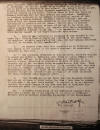
|
2.
6 August 1929.
Investigation of disturbance created by
Marines in Bilwi, Nicaragua, on July
27th, 1929, with Statements of
Witnesses.
Major C. H. Metcalf, CO Eastern
Area, Puerto Cabezas, to Gen. Dion
Williams, Managua, p. 2.
". . . 5. Dr.
Arana was from the evidence contained in
the statements attached, assaulted by
Privates Charles E. Pearcy and Alfred J.
Cerwensky. He did not appear to be
injured to any great extent and he makes
no allegation to that effect. Dr.
Arana’s sister-in-law, Helena Bolanos,
was by actual physical examination found
to be slightly injured on one wrist.
Private Frank W. Nell was tried by
Summary Court-Martial for this offense
and acquitted. According to evidence
contained in the Summary Court-Martial
record of that case, and to Helena
Bolanos’ statement hereto attached, she
and Private Nell and others were
attempting to stop the fight between the
Marines in question and Dr. Arana.
Private Nell or someone engaged in the
fight appears to have pulled her by the
wrist and caused a slight skin abrasion.
Dr. Arana’s wife, Maria Asuncion Arana
[sic], suffered a bruise on one leg. It
is impossible to determine which Marine
engaged in the fight inflicted this
bruise. ¶ 6. Robleto as indicated in
paragraph 3, was wounded in the upper
lip. Private Charles Pearcy was stabbed
in the chest under the shoulder,
slightly penetrating his lung. He has
rapidly recovered and will be returned
to duty immediately. ¶ 7. No comment
other than that contained in my
reference (b) with regard to the conduct
of the Guardia Nacional, is considered
advisable at this time. ¶ 8. The
principal offenders in this disorder,
Privates Charles E. Pearcy and Alfred J.
Cerwensky, were found by actual
examination of a medical officer, to be
decidedly under the influence of
alcoholic liquor. According to
statements of both of them, neither
remember any of the incidents which
happened during this time. From their
state of drunkenness at the time, it is
probable that they were not able to
remember anything they did for the
previous hour or more. Recommendations
for their trial by General Court-Martial
under all possible charges and
specifications growing out of these
incidents are being forwarded under
separate cover. ¶ 9. This disturbance is
the first that has happened between
Marines and citizens of Bilwi during the
time I have been in command of this Area
- the past three months. It appears to
be an isolated incident that might
happen at any time when men of combative
dispositions are under the influence of
alcoholic liquor. ¶ 10. A careful
examination of the statements attached
will show that at least two of the
signers of the radio to President
Moncada, have no personal knowledge
whatsoever of the disturbance. . . ."
|
|
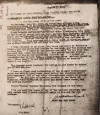
|
3.
6 August 1929.
Investigation of disturbance created by
Marines in Bilwi, Nicaragua, on July
27th, 1929, with Statements of
Witnesses.
Major C. H. Metcalf, CO Eastern
Area, Puerto Cabezas, to Gen. Dion
Williams, Managua, p. 3.
"Statement of
Doctor José Dolores Araña, 5 Aug. 1929. ¶
On Saturday, July 27, 1929, at about
four o’clock I was here in the store of
my brother Sebastian Arana, when I heard
some people shouting “They will kill
him!”. ¶ I ran outside and across the
street where I saw coming from back of
the house of Daniel Robleto three
marines with Robleto. Robleto had a pair
of scissors in his hand, which was taken
away by one of the marines. Robleto
started to run away and was followed by
two marines. They returned and I saw a
patch of blood on one of the marines
shirts; I do not know his name. ¶ I then
returned to my house (the house and
store of Sebastian Arana), and one
marine had Robleto by the neck, and was
kicking and hitting him. I spoke to the
marines and said “Do not kick that man
that way, leave him alone.” The marine
who was holding Robleto let him go and
turned and attacked me. I kicked at the
marine and we both fell. Then about
three marines jumped on me. After that I
do not know anything because as soon as
I could I ran inside. ¶ The provost
guard (marine) was having to use force
to subdue one of the marines. ¶ I have
no first hand information of the alleged
disturbances which are said to have
taken place before the incidents that I
have mentioned, nor of any other
circumstances except as stated above. At
the time in question persons in the
store of Sebastian Arana attempted to
close the three front doors, but two
marines entered. ¶ Carlos Vargas,
Guardia Nacional, was present at the
time. ¶ I do not know the names of any
of the marines involved; the only marine
that I could identify again is the one
who was stabbed. ¶ JOSE DOLORES ARANA"
|
|
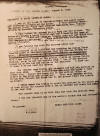
|
4.
6 August 1929.
Investigation of disturbance created by
Marines in Bilwi, Nicaragua, on July
27th, 1929, with Statements of
Witnesses.
Major C. H. Metcalf, CO Eastern
Area, Puerto Cabezas, to Gen. Dion
Williams, Managua, p. 4.
"Statement of
Maria Asunción Araña, 5 Aug. 1929.
¶ I was in the house of Sebastian Arana
and heard noise and confusion in front
of the house. I went outside (this was
before Doctor Arana went outside) and
heard Mrs. Robleto calling my husband,
Sebastian Arana. ¶ I went across the
street to see what was the matter. The
doors of Robleto’s house were closed and
I went to the back of that house. I did
not enter as Robleto came out and there
were four marines in the house. Some
marines were following the tailor
(Robleto). ¶ I saw Robleto run with the
marines after him. ¶ I returned to my
house and was standing by Doctor Arana
when he spoke to the marines; and when
the marines struck at him. When I saw
Doctor Arana on the ground, I, with my
sister Helena Bolanos, tried to get the
marines away. One of the marines kicked
me on the leg and hit me on the
shoulder. I know one of them, I do not
know the others. ¶ The provost came
during the struggle and hit the marines
to make them stop. When Doctor Arana ran
into the house I came inside too. Inside
the house one of the marines caught my
sister by the wrist and pulled her. This
same marine struck Mrs. Robleto and
threw her to the ground (this was inside
my house). ¶ I was trying to quiet the
marines in the store one of them struck
the counter with a can of carbide and
broke the glass in one show case. ¶ The
provost came in at this time and took
the marines away. ¶ I can not identify
any of the marines except the one
referred to above. ¶ MARIA ASUNCION
ARANA"
|
|
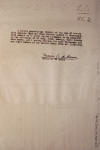
|
5.
6 August 1929.
Investigation of disturbance created by
Marines in Bilwi, Nicaragua, on July
27th, 1929, with Statements of
Witnesses.
Major C. H. Metcalf, CO Eastern
Area, Puerto Cabezas, to Gen. Dion
Williams, Managua, p. 5.
"I hereby
acknowledge receipt of the sum of twenty
five dollars ($25.00) from Private
Alfred J. Cerwensky. This amount is to
cover certain damages to my property on
the afternoon of 27 July, 1929, namely,
three broken show cases, and I hereby
release the said Cerwensky and any other
member of the Marine Corps from all
liability. ¶ Maria A. de Arana"
|
|
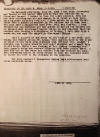
|
6.
6 August 1929.
Investigation of disturbance created by
Marines in Bilwi, Nicaragua, on July
27th, 1929, with Statements of
Witnesses.
Major C. H. Metcalf, CO Eastern
Area, Puerto Cabezas, to Gen. Dion
Williams, Managua, p. 6.
"STATEMENT OF PFC
EARL W. BELL, U.S.M.C. (PROVOST) ¶ On
Saturday afternoon, July 27, 1928 I met
Pvts. Cerwensky and Pearcy at the barber
shop across from the cantina run by
Cleveland Banard. I talked to them for a
few minutes. Both men had been drinking,
but did not appear to be drunk at that
time. This happened at about 3:45 p.m. I
then walked on up the street. There were
a number of marines in the cantina run
by Rosa Baez. The only ones I recognized
were Pvts. Nell and Clanton. I then
started for the barracks and had gotten
as far as the cantina run by Bolanos
when Lieutenant Darrah called me and
reported that two marines were causing a
disturbance in Bilway. I went back with
a woman who had made the report to
Lieutenant Darrah. ¶ When I arrived at
the scene of the trouble I saw Pvts.
Cerwensky and Pearcy attack Dr. Arana.
They had him down in the ditch in front
of his store when I pulled them off him.
Pvt. Pearcy, I noticed, had a blood
stain on his right shoulder and a small
hole in his shirt. While I was looking
at Pvt. Pearcy Cerwensky ran into
Arana’s store and started fighting with
some people there. I took him out of the
store and started both men towards the
camp. Pvt. Cerwensky helped me carry
Pearcy on into the barracks where we
turned him over to the corpsman at the
hospital. ¶ The only marines I
recognized during this disturbance were
those mentioned above."
|
|
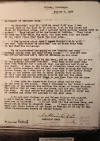
|
7.
6 August 1929.
Investigation of disturbance created by
Marines in Bilwi, Nicaragua, on July
27th, 1929, with Statements of
Witnesses.
Major C. H. Metcalf, CO Eastern
Area, Puerto Cabezas, to Gen. Dion
Williams, Managua, p. 7.
"STATEMENT OF
ANTONIO BAEZ. ¶ On Saturday, July 27,
1929 at about 4:00 p.m. I was sitting
down by the door of my office, next to
the house and store of Sebastian Arana,
and I noticed three marines coming down
the street. They walked up to the house
of Robleto. They tried to open one door
which was shut, and then went into the
house by the other front door which was
half open. ¶ A few minutes after that I
heard Robleto’s wife call out that “they
wanted to kill him” and so everybody
went to see what was happening. ¶ As we
approached the house we saw Robleto and
some marines coming from the back of the
house. I noticed that one of the marines
had a pair of scissors in his hand. ¶
Somebody told Robleto to run away, and
he ran. One or two of the marines
followed Robleto. Some time later they
came back with Robleto and I noticed
that one marine had blood on his chest.
I came to the house of Sebastian Arana
and when I was inside somebody told me
that they were kicking and hurting
Doctor Arana, so I went out of the house
and I saw Doctor Arana lying in the
street and two or three marines were on
him. At this time the marine provost
arrived and hit the other marines and
assisted Doctor Arana to get free from
the marines. ¶ I came into the house
with Doctor Arana and we went to the
back of the house. When I returned to
the front I noticed that one of the
marines was holding the wrist of Helena
Bolanos. The parine provost came into
the house, hit the man, and took him
away. As this marine was going out he
threw an empty can of carbide and broke
two glasses in one show case. ¶ I do not
know whether or not Helena Bolanos was
injured. I was a bruise later on the leg
of Mrs. Arana but I do not know how it
happened. I do not know who the marines
were, and would not be able to identify
them. I have no knowledge of what took
place inside of the house of Robleto or
of any of the other disturbances except
as stated herein. ¶ ANTONIO BAEZ”
|
|
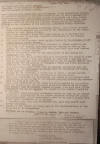
|
18 August
1929.
Petition from
Philemon Jackson, Syndico of the
Bilwi Community, to His Excellency José
Maria Moncada, President of Nicaragua,
Managua.
"May it please
your Excellency and Government, I the
undersigned Syndico of the Bilwi
Community as per power vested in me, by
the Intendents of Bluefields to hereby
respectfully desire to approach and
bring before your Excellency and Supreme
Government’s notice of a special and
very important matter which directly
concerns the rights of the Miskito
Indians as are contained in the Harrison
Altamirano Treaty 1905-1906. ¶ 1. That
according to Harrison Altamirano Treaty,
Art. 3 public pasture lands will be
reserved for the use of the inhabitants
in the neighborhood of such Indian
village. ¶ 2. That these aforesaid lands
have been granted to us surveyed and
titled received so per law, therefore
considered as the Indians bona-fide
property. ¶ 3. That part of said pasture
lands we have leased to the Bragmans
Bluff Lumber Company, Puerto Cabezas. ¶
4. That part of held lands in close
proximity to those leased to the above
mentioned company have been and are
leasing in lots by the Syndico to
private individuals on which dwellings
have been erected and various houses. ¶
5. That in consequence there of the
place Bilwi is now having the appearance
of a town. ¶ 6. That it has come to my
notice that your Government has declared
these said pasture lands a City, and
intend to establish a municipality. ¶ 7.
That an election was held on Sunday the
18 day of August 1929 at this said
Bilway for the purpose of electing a
Mayor and other municipal officers who
are all Spaniards. ¶ 8. That according
to Art. 6 and 7 of the Miskito
convention that the election of the
Nicaraguan Spaniards would be violating
the decree of the Miskito convention. ¶
9. In view of the foregoing, I hereby
beg to enter a solemn protest against
the actions of your Government as
noticed above. ¶ 10. That your
government has overstepped the rights of
the Indians thus endeavoring to lay
claims to the Indians property without
any arrangement has been made with us. ¶
11. That I the Syndico of my own lands
has to be guarded by the police, day and
night if not the Spaniards would have
killed me as I would not support them in
allowing Indians to vote, I am sure that
if the Commandante was not an American
who sticks to his duties I would be a
dead man. ¶ 12. I therefore claim that
your Government cannot in view of the
Treaty establish a municipality on the
Indians property without the proper
pre-arrangements, which arrangement
would be of such a nature that would
highly beneficial to us Indians. ¶ 13. I
therefore pray that your Government will
give this matter your prompt attention.
¶ 14. Copies of this letter are being
sent to the representatives of the U.S.
and H. M. Governments. ¶ Thank you in
advance. I beg to remain, Your obt
servant ¶ Syndico for Bilwi, Philemon
Jackson"
|
|
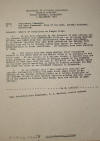
|
3 September
1929.
Report of Conditions on Wangks [Coco]
River, Department Commander
Capt. H. D.
Linscott, to Eastern Area
Commander Major C. H. Metcalf.
"1. It has been
reported by the Governor of CABO GRACIAS
via the Customs Service that HONDURAN
soldiers are occupying WASPOOK, SAULALA,
and LEMUS with full instructions from
their government. It is further reported
that they have prohibited the Indians
from cutting logs and it is thought
likely they expect to install an
administration in those localities. No
excesses have been committed by them. ¶
2. The report does not state whether
their occupation extends to the SOUTH
bank of the WANGKS RIVER or is confined
to the NORTH bank. If the latter, as I
believe likely, I believe they are there
primarily for the purpose of forcing
action on the boundary dispute as some
maps show the area to the NORTH of the
WANGKS RIVER at the three points
mentioned as being in dispute although
the HAM MAP shows the river as the
NORTHERN boundary of NICARAGUA. ¶ 3. It
is probable that I will have more
detailed and accurate information within
the next forty eight hours as Mr.
Downing of the Customs Service leaves on
a routine inspection of the customs
office at CABO GRACIAS tomorrow morning
and will radio me if the report is
founded upon facts upon his arrival in
CABO GRACIAS. ¶ H. B. LINSCOTT"
|
|
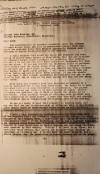
|
5 September
1929.
Letter from Area Commander
Major C. H.
Metcalf, Puerto Cabezas, to Col.
John Marston, Bluefields, p. 1.
"Dear John: ¶ Our
Quartermaster is somewhat concerned
about the Johnson Outboard Motors which
you hold on memorandum receipt from him,
since the enclosed radio from Brigade
apparently forbids such issuances of
Marine Corps property to the Guardia. ¶
I still believe that since two boats are
required for servicing of Marine Corps
planes at Bluefields, that you are
entitled to necessary Marine Corps
equipment for providing that service.
However, I do not believe that three
motors are necessary for this purpose
alone. If you can provide the necessary
funds to purchase these motors from the
Marine Corps after survey, I believe
that we can give you a good price on
them and furnish you with a reasonable
supply of spare parts gratis. I will
await advice from you before taking any
action about these motors. If you are
unable to buy them, I will request
permission from Brigade for you to
continue to hold two of them on the same
status that they are now being held
under. ¶ Both Alban and Linscott have
been detailed as members of a General
Court-Martial to try four cases here.
The court is to meet September 11th or
as soon thereafter as practicable. The
papers have not arrived and there is no
mail service in sight. Native witnesses
are involved, one of whom at least, Dr.
Arana, is in Bluefields. Other possible
delays of trial may come up which will
delay completion of these cases. I hope
that they will not greatly inconvenience
you in reorganizing the Eastern Area of
the Guardia. ¶ We are all sorry to hear
that Linscott is leaving here, but can
see that you are in serious need of
efficient help in Bluefields. Alban
should prove of considerable value to
you as well as First Sergeant Riewe. ¶ I
held a real interesting conference with
the Vice President of the Standard Fruit
and Steamship Company and Mr. McKay, the
local Manager of that Company here, a
short time ago. My clerk took a brief -
stenographic notes - of the conference,
and he and I together compiled the
enclosed notes which are, I believe,
somewhat illuminating in regards to
local conditions in Puerto Cabezas and
out along the railroad operated by this
company. Perhaps I am local in my views,
but I sometimes think frankly that you
do not consider this locality as
important as it really is. I do not know
the exact figures, but I should imagine
that the population in Puerto Cabezas
and on the prop- . . . "
|
|

|
5 September
1929.
Letter from Area Commander
Major C. H.
Metcalf, Puerto Cabezas, to Col.
John Marston, Bluefields, p. 2.
". . . erties of
the Fruit Company here is probably
greater than all of Eastern Nicaragua
south of the Rio Grande River. As the
enclosed notes will show and also the
police records of your Guardia here,
this community is cursed with an
undesirable foreign element and strong
racial prejudices on the part of the
Nicaraguans against foreign labor which
has been imported here. ¶ After
considerable study of the question of
possible revolutionary movements in
Eastern Nicaragua, I am convinced that
this company of Marines here supporting
your Guardia can prevent any such
movements from getting started. I also
believe that a ship of the Special
Service Squadron on this coast could
have the same results. Since it is so
distasteful to the cruisers to remain on
the Eastern Coast of Nicaragua they will
probably use all of their influence to
keep the Marines here in order that
there will be less reason for them to
come to this part of Central America. So
it looks as if the Marines will be here
for some time, unless the Special
Service Squadron ships are required to
take over the protection of this coast.
¶ You will note from reading the
attached conference notes that the
management of the company does not
appear particularly willing to make the
labor changes which I suggested in order
to relieve the strain of racial
prejudices which now exists in this
community. ¶ I am sending an officer and
a small patrol to Cape Gracias by the
next transportation in order to make
proper arrangements for gathering
information from that locality in the
future, and to accumulate all of the
latest information relative to
disturbances in that area. I will send
you from time to time, a copy of our
intelligence report which will keep you
informed as well asI am, about the
situation in this area. The report by
the Governor of Cape Gracias that the
Honduranian soldiers are occupying
several towns on the north bank of the
Wanks is causing some anxiety here. If
the situation does not clear up in the
near future, I anticipate sending a
patrol up the Wanks to the limit of
motor boat transportation, in order to
fully develop the situation, to reassure
the people along the river, and for the
possible morale effect on bandits who
may be anticipating action in that
vicinity. ¶ Let me know if there is
anything that we can do for you here in
any way whatsoever. Our Post Exchange is
rapidly extending its facilities in
order supply more of our wants and our
Commissary is functioning very nicely.
We will be glad to supply you and your
officers from both of these."
|
|
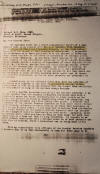
|
5 September
1929.
Letter from Area Commander
Major C. H.
Metcalf, Puerto Cabezas, to Col.
R. Y. Rhea, Managua, p. 1.
"The enclosed
notes are a brief stenographic report of
a conference held at my request with Mr.
L.J. Vacarro, Vice President of the
Standard Fruit and Steamship Company,
and Mr. John McKay, manager of the
branch of that company at this place. I
requested the conference with these
gentlemen with the purpose of obtaining
their views relative to the needs of
protection of American interests in this
community. As you know, their company is
the only American company of any
consequence operating in North Eastern
Nicaragua. Their company claims a
capital of investment of about
$12,000,000.00 which is, I believe,
greater than all other foreign capital
investment in the Eastern half of
Nicaragua. My purpose in calling the
conference was not only to get their
views as to what protection they felt
the need of, but also to see whether or
not they could not be persuaded to adopt
certain measures which would tend to
lessen the need for protection, so far
as their property and personnel is
concerned. ¶ A brief study of the
attached notes will show the attitude of
Mr. McKay with regards to the need of
protection against future revolutions as
well as my own opinion that the danger
from revolution is very remote so long
as the Marines occupy Managua. ¶ After a
careful consideration of all the factors
involved, I am of the opinion that one
company of Marines stationed here with a
reasonable means for rapid
transportation to other points on the
coast, can prevent or break up
immediately after its inception, any
revolutionary movement that will likely
take place. I believe that a cruiser of
the Special Service Squadron on this
coast could prevent revolutionary
outbreaks or break them up in their very
beginning as well as the Marines could.
I had been led to believe from
statements of a Staff Officer of the
Special Service Squadron that one
cruiser of that Squadron would be
habitually on this coast. Actually,
since my arrival here, there has been no
ship on this coast for more than three
days at a time and then at long
intervals. It appears to me under
present conditions that a cruiser would
be of more probably use here than at
Corinto, where I understand one is being
kept at all times. ¶ From my
acquaintance with officers of the
Special Service Squadron I believe that
it is very distasteful to them for their
ship to be . . . "
|
|
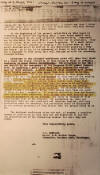
|
5 September
1929.
Letter from Area Commander
Major C. H.
Metcalf, Puerto Cabezas, to Col.
R. Y. Rhea, Managua, p. 2.
". . . lying off
the Eastern Coast of Nicaragua. I cannot
say that I blame them for this, but I
assume that due to that fact, they will
always be anxious to avoid duty on this
Coast. ¶ At the beginning of the present
activities on this coast in attempting
to locate the (mystery ship) I have
found myself very much handicapped by
the lack of Marine transportation.
Schooners can be chartered for about
$75.00 a day when one is available. They
are of course, slow, and are at times
dangerous. If a small naval vessel of
any type capable of carrying a few
Marines were on this coast, Marines
could be shifted to any threatened point
in a very few hours. As it is, it is
necessary at times to wait several days
for a schooner to come along that will
furnish us with the necessary
transportation. ¶ Reference to the
attached conference notes will show that
there is a labor and racial situation in
this vicinity which is probably
conducive to minor future disturbances.
The situation is one that was created by
the management of the Bragmans Bluff
Lumber Company here, by importing a
great many West Indian negroes for
employment by their company. A great
many of these laborers have proved to be
trouble makers and some among them have
proved to be desperate characters. The
worst feature however in this connection
seems to be that the native Nicaraguans
in this part of the country have a
strong dislike for these people, and
will likely with a little agitation,
create serious racial strife with these
West Indian negroes. The Manager here
does not seem to be sufficiently
interested in my suggestion to gradually
eliminate the trouble making labor
element from their payrolls. He contends
that even though it was a mistake to
bring these people from one point of
view, it was a necessity. He expects
protection from our Government against
these outbreaks, even though they were
created by the previous management of
the Company, and could be eliminated
with considerable cost to the Company.
My contention is, that our Government
does not owe Americans and American
capital, military protection when the
necessity for protection could be
eliminated by the parties concerned if
they should take the proper steps to do
so. ¶ The enclosed conference notes are
not, of course, a complete survey of
conditions in this area but are
submitted to you for the consideration
of the Commanding General for what they
are worth."
|
|
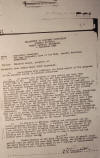
|
6 September
1929.
Enlisted School, Progress Of.
Department Commander
Capt. H. D.
Linscott, Puerto Cabezas, to Area
Commander Major C. H. Metcalf, Puerto
Cabezas.
"Reference: Area
Comdrs Radio 10305 September ¶ 1. In
accordance with reference the below
report of the progress of the enlisted
school is herewith submitted. ¶ 2. In
general the progress of this school has
been very gratifying to me. Most of the
men who upon enlistment from 1 June 1929
to 8 August 1929, could not sign the
enlistment contract, are now signing
their names and many of them are able to
read and write in varying degrees
depending upon the interest and
intelligence of the individual. A few
are still unable to sign their names but
these have been placed upon a modified
restricted list and are not allowed as
extensive liberty as other men until
they can sign to the satisfaction of the
Department Commander. Most of the men,
especially the Mosquito boys (most of
whom enlisted largely for the
educational advantages of service in the
Guardia) take a great interest in their
school work and are making good
progress. As a matter of fact I was
surprised to find that the Mosquito
illiterates made better progress than
the Spanish illiterates, due I think to
their ambition which even after a year’s
contact with me I had not heretofore
discovered they possessed. The Spanish
illiterates (and a very few of the
Mosquitos) have had to be driven to
their classes and cut them at every
opportunity but my present scheme of
modified restriction will, I am sure,
soon bring results. This scheme will
later be applied to arithmetic, reading,
spelling and geography as the school
progresses. ¶ 2. In addition to writing,
reading and arithmetic and a little
geography have been given. I consider
the latter especially necessary for the
Guardia and find they have a great
interest in it. I can conceive of no
more valuable soldier than a properly
trained and disciplined Mosquito boy
with his knowledge of woodcraft and
tracking and at the same time an ability
to read a simple map and perhaps make a
simple sketch. ¶ 4. Random samples of
the work of several men who upon
enlistment could neither read nor write
nor even sign their names, are herewith
attached. The worse fault of all the men
seems to be a feeling of helplessness
when they do not have a copy to follow.
¶ H. D. Linscott"
|
|
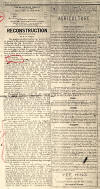
|
7 September
1929.
The Bluefields Weekly.
"Reconstruction" by R. M. Hooker.
|
|
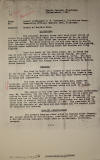
|
1.
13 September 1929.
Report of Neptune Mine, from
2nd Lt. C. F.
Cresswell, Puerto Cabezas, to
Major C. H. Metcalf, Puerto Cabezas, p.
1.
"HISTORICAL
¶ The original Bonanza mines date back
about thirty or thirty five years and
were owned and discovered by Mr. La
Peard who was alleged to have made about
two hundred thousand dollars from the
mines. The main working of the old mine
being in shafts from fourteen hundred to
twenty five hundred yards from the
present Bonanza mines commissary and
bearing about two hundred and fifty
degrees. ¶ Upon the death of the first
owner, Mr. La Peard who was an American
and had a wife in the United States, the
mine passed to an illegitimate daughter
of Nicaraguan birth. The mine with all
work and equipment and the mines now
being worked by the Bonanza Mines were
sold for twenty five thousand dollars to
Bonanza Mines Company. ¶
NEPTUNE ¶
The town is built in a hollow of land at
the junction of the La Luz, San Pedro,
Limon, Tunki, Big Falls and Brown’s Camp
trails. All trails are suitable for bull
and mule travel only and at times are
impassable. ¶ The town contains about
two hundred men, women and children,
about one hundred being on the company
pay roll. All employees excepting a few
departmental heads are paid in coupons
issued upon the company commissary. Two
people in the town have claims to
American citizenship one, Mr. Napoleon,
who has been in the area about thirty
years and states he does not intend to
return to the United States and the
second man has an honorable discharge
from the U.S. Cavalry and has since been
in several Central American revolutions
and was known to Jiron when the latter
entered Neptune in 1928. The remainder
of the population consists of one Dane
and one German and the regular quota of
Jamaicans and natives. ¶
COMPANY
ORGANIZATION ¶ The present
Bonanza mines owned by Bonanza Mines
Company, Mr. Joseph Warnick of
Philadelphia, president; and Mr. John
Smeddle, a British mining engineer,
whose home is in Fountana, California,
manager. . . . "
|
|
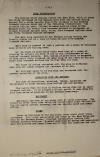
|
2.
13 September 1929.
Report of Neptune Mine, from
2nd Lt. C. F.
Cresswell, Puerto Cabezas, to
Major C. H. Metcalf, Puerto Cabezas, p.
2.
". . .
MINE INDEBTEDNESS
¶ The Bonanza Mines Company bought the
Eden Mine, which is about two miles
northwest of the Bonanza Mine from the
Tenapah Mining Company for a price
ranging from fifty thousand to one
hundred thousand dollars under one of
the following transactions: ten thousand
dollars cash, fifteen thousand dollars
stock in the Bonanza Mines and twenty
five thousand dollars in mortgages; or
fifteen thousand dollars cash, thirty
five thousand dollars stock and fifty
thousand dollars mortgage. ¶ The Eden
mine operated by the Tenapah mining
company was finally closed out at a loss
of three million five hundred thousand
dollars. ¶ Eden mine at present is just
a pasture and a group of buildings many
of which are falling down. ¶ Mr.
Springer of Bluefields holds some kind
of a power of attorney to operate the
mine to pay up and indebtedness of one
hundred thousand dollars. Mrs. Clancy of
Bluefields is supposed to have about
forty thousand and Quan Sing of San
Pedro de Pis Pis about four thousand
dollars due to them from the mine. ¶ The
names of others connected with the mine
in different ways are; Mr. Harry Johnson
and Petersen of La Luz. ¶ Mr. Springer
seems to be the only man concerned with
the present operation of the mine. ¶
OPERATION COST
AND RETURNS ¶ The cost of
operations, overhead, upkeep, expansion
and improvement is about seventy five
hundred dollars monthly. ¶ The return
from the mine in bullion varies from six
to eight thousand dollars. It is thought
a slight profit is made from the mine
from sales of supplies in the company
commissary. ¶
EQUIPMENT ¶ Equipment consists of
one stamp mill of three batteries. The
output is about forty tons daily are
valued about eight dollars per ton and
eighty percent recovery, and one cyanide
plant and assay office. ¶
POWER ¶
Power is furnished by the Big Falls
power plant eight miles northwest. This
plant was erected and owned by the Eden
Mines and sold to the Bonanza Mines.
Original installation costing four
hundred thousand dollars. Present
condition of meters and generators good
but sluices and power lines are in very
bad condition and will . . . "
|
|
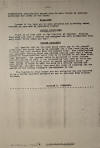
|
3.
13 September 1929.
Report of Neptune Mine, from
2nd Lt. C. F.
Cresswell, Puerto Cabezas, to
Major C. H. Metcalf, Puerto Cabezas, p.
3.
". . .
necessitate considerable expenditure in
near future to continue operation for
power at the mines. ¶
BUILDINGS
¶ Houses in the town are on mine
property and privately owned, erected or
acquired by squatters rights. ¶
MINING CONDITIONS
¶ There is no free gold in the vicinity
of Neptune. Panning from good ore with a
crusher and amalgamation with
quicksilver nets only about fifty cents
per day. ¶ FUTURE
PROSPECTS ¶ Mr. Smeddle told me
the mine would never pay in its present
condition, but would have to be enlarged
and a new installation put in about one
mile distant from the present site. New
installations and equipment costing
about one million dollars also that a
better method of transportation would
have to be devised to cut down overhead
expenses. The present value he estimated
at about fifteen million dollars of gold
in the surrounding hill some of which
has been worked open and other which is
purely estimated value. He also stated
he hoped to sell the mine to a British
concern and thought Mr. Springer would
turn over his power of attorney for the
amount of the mining company’s
indebtedness to him. ¶ The figures in
this report are not authentic but are
believed to be a fairly accurate
estimate as can be obtained from various
sources."
|
|
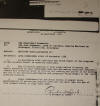
|
13 September
1929.
Enlisted School, Progress Of.
Capt. Richard S.
Reed, Bluefields, to Major C. H.
Metcalf, Puerto Cabezas.
|
|
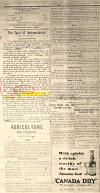
|
13 September
1929.
The Bluefields Weekly, p. 1.
"The
Spirit of Independence," by R. M.
Hooker.
|
|
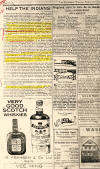
|
13 September
1929.
The Bluefields Weekly, p. 2.
"HELP THE
INDIANS."
|
|
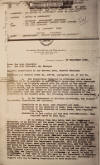
|
1.
16 September 1929.
Inspections of the Eastern Area, Guardia
Nacional, Col.
John Marston, Bluefields, p. 1.
"Subject:
Inspections in the Eastern Area, Guardia
Nacional ¶ Reference (a) General Order
No. 100-29, paragraphs 16, 17 and 24. ¶
1. The inspections directed in reference
(a) are most [desireable] if it is
possible to make [them] without
neglecting other important duties, and I
am in hearty accord with the spirit of
the entire General Order. When fully
officered, and all officers of the Area
are in good health, and no unforeseen
interruptions occur, it may be possible
to carry out the letter of the General
Order referred to. In order, however,
that the Jefe Director may be fully
cognizant of the conditions in the
Eastern Area, the following information
is submitted. ¶ 2. In the Department of
Southern Bluefields, the following
monthly inspections are directed: ¶
Bluefields to La Cruz: time required one
week. ¶ Bluefields to the District of
Rama: time required four days. ¶
Bluefields to the District of Punta
Gorda: time required five days. ¶
Bluefields to Las Perlas (if and when
reestablished): time required three to
four days. ¶ It is obvious from this
table that the Department Commander, if
he carries out the order literally, will
be absent from Bluefields practically
every week in the month. Bluefields is
the training center of the Department.
Most of the local garrison consists of
untrained recruits who must be given
intense training and to whom close
association with their officers is most
essential. At present the Department
Commander in Bluefields is having a
great deal of trouble keeping up with
his local work. Clerical assistance is
not dependable and is difficult to
procure under any conditions. The
preparation of the Department pay-roll
is in itself a task requiring nearly a
week of careful work which the
Department Commander, with his present
untrained office force, must give
personal supervision. All but two of the
posts in the Department are officered by
unusually able lieutenants who are free
form almost all administrative duties
and are able to make frequent
inspections of the towns in their
districts. While realizing that the
inspections ordered in reference (a)
should be made if practicable, I feel
that if they are made in the Department
of Southern Bluefields, the work in
Bluefields will suffer. For this
Department I suggest that the following
inspections be made mandatory: . . . "
|
|
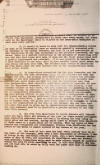
|
2.
16 September 1929.
Inspections of the Eastern Area, Guardia
Nacional, Col.
John Marston, Bluefields, p. 2.
". . . of posts
not officered by commissioned officers
shall be visited by an officer from
Department headquarters at least once
every month; all other posts in the
Department shall be visited by the
Department Commander at least once every
quarter. ¶ 3. It should be borne in mind
that all transportation within the Area
is by boats which leave on schedules
generally connected with the loadings of
the banana steamers, and that it is not
practicable to make inspections at any
time convenient to the officers
concerned. For this reason, there is a
decided restriction to the movement of
inspecting officers and this fact alone
will make it apparent why their
inspections will be greatly handicapped
and retarded. it is not possible to
include two or more districts in one
trip. This is also another factor which
makes for long delays and much lost
time. The officers must return to
Bluefields and from there start out into
another area on the transportation which
first offers itself. ¶ 4. In inspections
prescribed for the Area Commander and
the Area Executive, the same reasonings
hold. If all officers are well and
present for duty, and nothing unforeseen
occurs to require the personal presence
of the Area Commander in Bluefields, it
is quite possible that that officer
could spend one-half his time in
inspections away from Area Headquarters.
Such favorable conditions cannot be
expected. At present the Department
Commander is on the sick-list with
malaria, a not uncommon ailment on this
coast. The Area Commander is assisting
in Departmental work. In addition, he is
Disbursing Agent and Commanding Officer
of Headquarters Detachment. Clerical
help is almost non-existent. The Area
Medical Officer is also ill. This means
a readjustment of work all around and
has thrown additional labor upon every
officer available for duty in
Bluefields. I have no objection to
spending twelve hours a day on Guardia
work, and gladly give every ounce of my
strength to building up the organization
in the days of its infancy, but the fact
that this much time must be given now to
administrative work indicates that the
Area Commander must be in Bluefields a
greater portion of the time than fifty
percent. ¶ 5. The trip from Bluefields
to Puerto Cabezas will take at least ten
days. There are seasons of the year (at
times rather prolonged) when coast-wise
schooners have difficulty in making the
trip owing to heavy gales and bad
weather, during which times an absence
from Bluefields for the period of one
month is almost assured at any season of
the year. ¶ 6. The work of this Area has
kept every officer busy up to the limit
of his strength. Even with a full
complement of officers, I see no let-up
in any individual officer’s case, only a
more thorough performance of duty by
every one concerned. To superimpose upon
our present work mandatory inspections
which must be made without regard to
conditions within the area is quite
appalling to one, in this case myself,
who has not yet been able to catch up
fully with the paper work that is
continually backing up. . . . "
|
|

|
3.
16 September 1929.
Inspections of the Eastern Area, Guardia
Nacional,
Col. John Marston, Bluefields, p.
3.
". . . upon the
fact that the administrative work of the
Area has not been properly organized and
requires constant supervision and
correction, I request that I be informed
whether the inspections required in
reference (a) will be made mandatory
within the Eastern Area at once or
whether the provisions of the General
Order referred to will be held in
abeyance until the Area is better
organized and recommendations can be
made in the light of further experience
as to the number of inspections to be
required of the various Guardia officers
concerned."
|
|
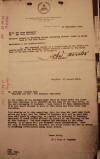
|
20 September
1929.
Orders to Honduran Troops Occupying
Several Towns On North Bank of the Coco
River. Report from
Col. John
Marston, Bluefields, to Jefe
Director GN, Managua.
|
|
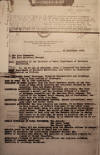
|
1.
22 September 1929.
Inspection of the District of Rama,
Department of Southern Bluefields,
Col. John
Marston, Bluefields, p. 1.
"1. On 18 and 19
September 1929, I inspected the District
Rama, Department of Southern Bluefields,
and report on conditions in that
district as follows: ¶ [ . . . ]
INSPECTED: Rama, Nicaragua, District
Headquarters and principal town in that
section of Nicaragua. ¶ SIZE OF TOWN:
700 to 1000 population. ¶ CHARACTER OF
TOWN: Largest town and chief business
center of the District of Rama which
includes the territory drained by the
Escondido, Rama and Siquia Rivers. ¶
COMMERCIAL ACTIVITIES: Merchandising,
wholesale and retail. The town contains
a market, and has contains offices of a
number of mahogany companies and the
American Fruit Company. The offices of
the Cuyamel Fruit Company are at
Providence, ten miles down the river
from Rama. ¶ COMMERCIAL ACTIVITIES OF
SURROUNDING COUNTRY: Banana plantations,
mahogany camps and cattle farms. ¶
RELIGIOUS ACTIVITIES: The town contains
one church. It is Roman Catholic. In
this report, it differs from most of the
other towns on the West Coast which are
chiefly Protestant in religious
affiliations. (Note: The priest at Rama
is a rather difficult person to deal
with and Guardia officer in charge has
little to do with him. He mixes in
politics and is not particularly popular
in Rama. It is rumored that he to be
relieved.) ¶ PUBLIC OFFICIALS IN LOCAL
RESIDENCE: The Alcalde ¶ The local judge
¶ The Fiscal Agent ¶ (Note: All are
cooperating with the Guardia officer in
charge.) ¶ Guardia posts in the District
of Rama: One (at Rama). ¶ Number of
officers: one (Lieutenant Alexander
Moldey, GN). ¶ Number of enlisted men:
Eleven. The garrison is temporarily
reduced by reason of recent transfers. ¶
Authorized strength of garrison: one
officer and eighteen enlisted. ¶ Health
of command: Excellent. ¶ Condition of
clothing: Excellent. . . . "
|
|
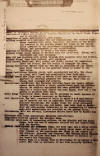
|
2.
22 September 1929.
Inspection of the District of Rama,
Department of Southern Bluefields,
Col. John
Marston, Bluefields, p. 2.
". . . Number of
automatic weapons on hand: Two. One
Lewis and one Thompson gun. ¶ Condition
of rifles and automatic weapons:
Excellent. No short front sight; and no
missing parts. ¶ Ammunition on hand:
Approximately 2000 rounds. ¶ Building
occupied as a barracks: The old
Commandancia. Two stories high. Frame
construction, sheet iron roof. All parts
of the building occupied by the Guardia
except two rooms on the second floor
occupied by the Government telegraph
operator and his family. The arrangement
is not objectionable. ¶ Condition of
building: Good. It needs a few minor
repair. ¶ Barracks rooms: Large enough
to provide beds for 16-18 men. Clean,
well ventilated and well arranged. ¶
Beds: All men provided with native
tijeras with mosquito nets and frames. ¶
Kitchen: Clean, free from insects, well
equipped. ¶ Meals served: Excellent.
Well cooked and nicely served. No
complaints about the ration. The 25c
ration is adequate for Rama. ¶ Bathing
facilities: Shower bath for the men is
available at all times. Rain water
stored in six gasoline drums is piped to
the bath house. ¶ Toilet facilities:
Outside privy, well constructed and dry.
The place is clean, well limed and
practically free from odor. ¶ Storage
space: One large room on second floor
next to the officer’s quarters is
entirely adequate for storage. This room
is clean, well arranged and orderly. ¶
Recreational facilities: The barracks
building faces the town’s public square
which affords a large, grassy level park
for outdoor sports. No athletic
equipment has been provided. The post
requires a volley ball outfit and some
balls, bats and a few gloves to practice
base ball. ¶ Rifle Range facilities:
None. These can be provided at small
expense if a range is deemed necessary
or desirable. ¶ Jail facilities: Two
well constructed cells in which B & W
punishments can be carried out are an
important factor in maintaining military
discipline. Two larger rooms for civil
prisoners chiefly inebriates, men and
women, come into town on Saturdays and
over-extend themselves in the
consumption of Government-sold
aguardiente are provided on the ground
floor. ¶ Punishments: Mild but certain.
Lieutenant Meldey knows how to handle
his men. ¶ Relations with civil
population: Entirely satisfactory. ¶
Complaints received against the Guardia:
None. ¶ Official calls made by
inspecting officer: On the Alcalde and
the Local Judge. Both are men of
mediocre ability but are cooperating
with the Guardia. ¶ GENERAL OBSERVATIONS
AND COMMENTS: Rama, one year ago, was a
dirty little village, chiefly noted for
its unduly large share of an unruly
element of the population who lived on
the rivers in the district. Disorder was
frequent. The Cuyamel Fruit Company
removed its offices from Rama to
Providence on account of the town’s bad
reputation. Today, Rama is a unique town
in Nicaragua. It is really a show place.
The town is spotless. It has been
properly drained, . . . "
|
|

|
3.
22 September 1929.
Inspection of the District of Rama,
Department of Southern Bluefields,
Col. John
Marston, Bluefields, p. 3.
". . . every yard
is cleaned regularly twice a week, every
street is leveled and drained and free
from litter, sidewalks generally are in
good repair. Most remarkable of all,
there are no flies and few if any
mosquitos. It is the cleanest town I
have ever seen in the tropics. I
personally inspected the kitchens in two
Chinese restaurants and they were
cleaner by far than any kitchen I have
ever seen in a similar restaurant in the
United States. I saw one fly during my
two days in Rama. The people are orderly
and apparently contented. ¶ Lieutenant
Meldey is an unusually well-equipped
Guardia officer. His familiarity with
the language and his knowledge of the
customs of Latin-Americans stand him in
good stead in his present field of
activity. He is entirely devoted to his
duties to which he applies all his
waking moments. I wish every Guardia
officer could see the accomplishments of
Lieutenant Meldey in Rama as a
demonstration of what can be
accomplished in Nicaragua in the way of
civil improvement, combined with
conspicuously successful achievements in
training and controlling his Guardia
personnel. ¶ 2. I recommend that
Lieutenant Meldey be given a letter of
commendation from the Jefe Director for
his most satisfactory performance of
duty while in charge of the District of
Rama during the past nine months."
|
|
|
|
|
PREVIOUS
NEXT
|
|
|
|
|
|
|
|
